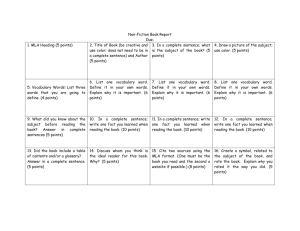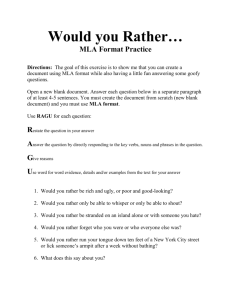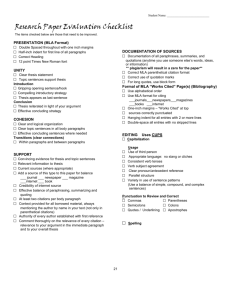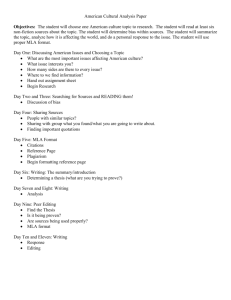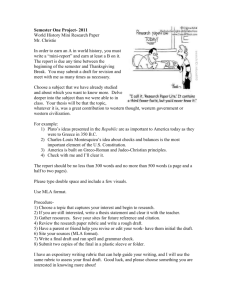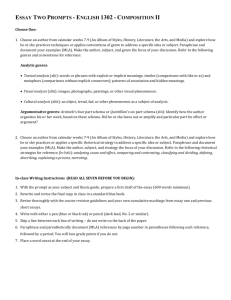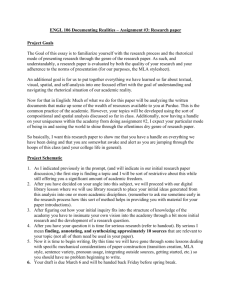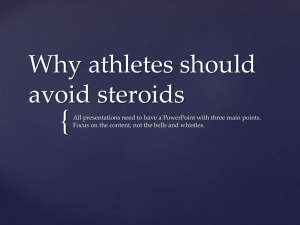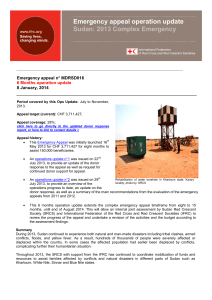Literature Review/Annotated Bibliography
advertisement
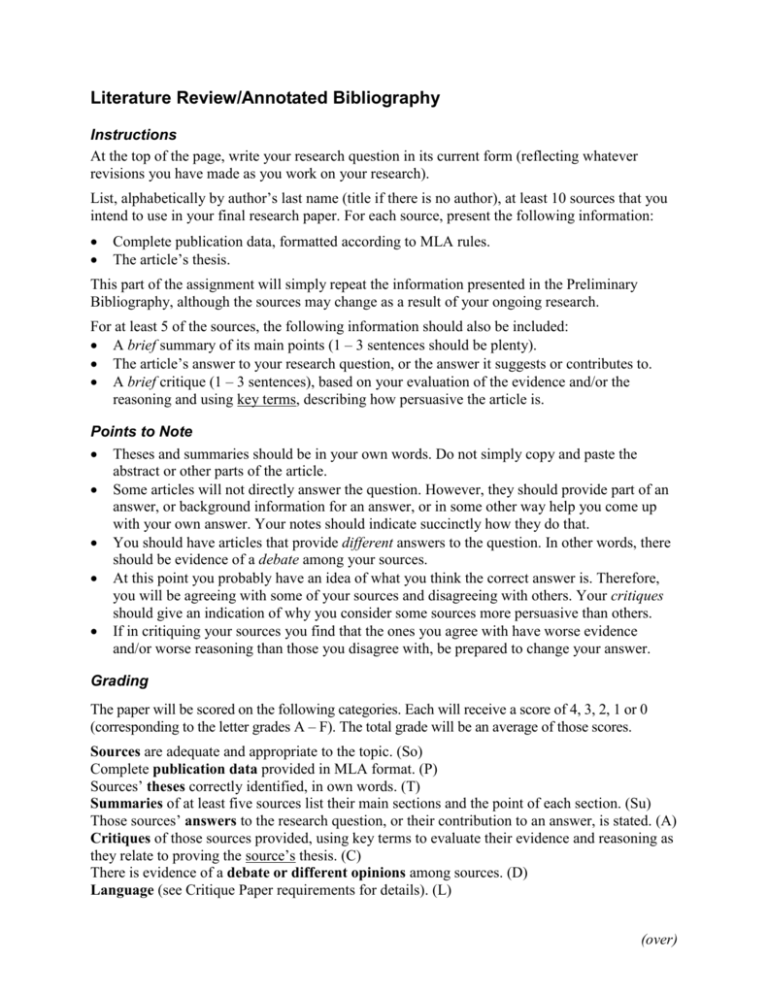
Literature Review/Annotated Bibliography Instructions At the top of the page, write your research question in its current form (reflecting whatever revisions you have made as you work on your research). List, alphabetically by author’s last name (title if there is no author), at least 10 sources that you intend to use in your final research paper. For each source, present the following information: Complete publication data, formatted according to MLA rules. The article’s thesis. This part of the assignment will simply repeat the information presented in the Preliminary Bibliography, although the sources may change as a result of your ongoing research. For at least 5 of the sources, the following information should also be included: A brief summary of its main points (1 – 3 sentences should be plenty). The article’s answer to your research question, or the answer it suggests or contributes to. A brief critique (1 – 3 sentences), based on your evaluation of the evidence and/or the reasoning and using key terms, describing how persuasive the article is. Points to Note Theses and summaries should be in your own words. Do not simply copy and paste the abstract or other parts of the article. Some articles will not directly answer the question. However, they should provide part of an answer, or background information for an answer, or in some other way help you come up with your own answer. Your notes should indicate succinctly how they do that. You should have articles that provide different answers to the question. In other words, there should be evidence of a debate among your sources. At this point you probably have an idea of what you think the correct answer is. Therefore, you will be agreeing with some of your sources and disagreeing with others. Your critiques should give an indication of why you consider some sources more persuasive than others. If in critiquing your sources you find that the ones you agree with have worse evidence and/or worse reasoning than those you disagree with, be prepared to change your answer. Grading The paper will be scored on the following categories. Each will receive a score of 4, 3, 2, 1 or 0 (corresponding to the letter grades A – F). The total grade will be an average of those scores. Sources are adequate and appropriate to the topic. (So) Complete publication data provided in MLA format. (P) Sources’ theses correctly identified, in own words. (T) Summaries of at least five sources list their main sections and the point of each section. (Su) Those sources’ answers to the research question, or their contribution to an answer, is stated. (A) Critiques of those sources provided, using key terms to evaluate their evidence and reasoning as they relate to proving the source’s thesis. (C) There is evidence of a debate or different opinions among sources. (D) Language (see Critique Paper requirements for details). (L) (over) Rubric This rubric describes the type of work that will earn a 4, 3, 2, 1 or 0 on each of the eight scored items (criteria) for this assignment. Keep in mind that when multiple types of problems are listed, a paper can receive a low score for any of those problems, not just the combination of all of them. For example, a paper can receive a 1 for Sources if it simply has too few sources, regardless of whether there are also significant gaps in coverage, lack of effort to find multiple perspectives, reference works in place of other sources, or many irrelevant sources. So P T Su A C D L 4 Sources are varied in perspective, cover all necessary angles ; most are in-depth (scholarly or long general interest); all are clearly relevant to question MLA format with no or only trivial errors (e.g. punctuation, font) Source’s main claim is clear, accurate, precise, focused, expressed as a claim in your own words Structure is clear, main points expressed accurately Clear answer to question, direct or implied in source Gives specifics of evid and/or assumptions; uses key terms to evaluate, indicates reasons for eval. Multiple sources on different sides, clearly supporting different answers to research question Few/no errors; style is fluent, (semi-) formal, concise, precise. 3 Reasonable variety of perspective, some small gaps and/or slight lack of scholarly/indepth sources; a few srcs not relevant to question MLA format with one or two larger errors (1-2 missing info or out of order) Clear but not quite focused or accurate, not phrased as a claim, or too close to src’s words Covers most main points but not in a way that makes the structure clear Answer is somewhat unclear; reader must work or guess to see it Gives some specifics, uses some key terms; may not clearly indicate reasons At least a few sources on different sides; reasonably strong indication of different answers Occasional mechanical errors and/or awkward sentences 2 Significant gaps in coverage of the topic, most srcs do not cover topic in enough depth; several srcs not relevant to question MLA format with a pattern of significant errors (2-3 missing info or out of order) Main topic is clear but no claim is expressed; claim might be inferrable with effort; in source’s words Some main points but haphazard and/or incomplete Simply says that source provides an answer but does not say what it is Describes evidence, attempts to evaluate but without using key terms; does not provide reasons Some indication of different answers but vague or unclear Consistent mild to moderate pattern of error and/or style problems 1 Too few srcs; severe gaps in coverage; clear lack of effort to find multiple perspectives; reference works in place of other srcs; many irrelevant Inconsistent format and/or severe errors (3+ sources missing info, out of order) A vague statement of topic with no indication of what point the source is trying to prove 0 Far too few sources; exclusive use of reference works; most sources bear no discernible relation to topic Incomplete; restates thesis w/ no indication of main points Says src does not answer, w/o saying what answer can be inferred Attempt is made to evaluate, but is so incomplete as to be virtually absent Missing Very little indication that sources suggest different answers to research question Consistent severe pattern of error and/or awkward sentences Sources are unanimous; no evidence of looking for sources with opposing views Pattern of error is so severe as to be incomprehensible in places Does not follow MLA format; sources not in alpha order Missing Missing Missing
